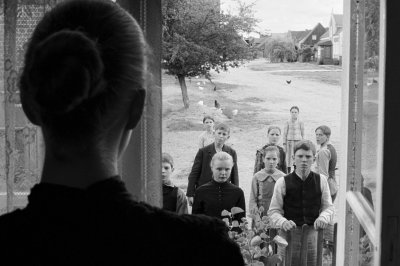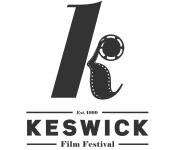Reviews - The White Ribbon
The White Ribbon
Reviewed By John Stakes

The White Ribbon
The films of Austrian director Michael Haneke are for his audiences as much an exercise in self examination as the unfolding of events on screen for our delectation. The viewer is left to draw his or her own conclusion as to the significance of what has been shown and many questions are deliberately left unanswered.
His Palme D’Or winner at the 2009 Cannes Film Festival is no exception. What are we to make of the mysterious events occurring in and around the rustic community setting of Northern Germany in 1913 as recalled (accurately?) by the local school teacher in later life? Are we witnessing the seeds of fascism being sown as the seemingly ordered and predictable existence of the villagers crumbles before our eyes in the wake of apparent random acts of unexplained violence metered out to young and old alike? Was the repression of the villagers a reflection of the suppression of the destructive German psyche?
The film’s title relates to the ribbons which misbehaving children are required to wear in a shaming ritual which serves also to remind them of the purity and innocence to which they should aspire. The film was deliberately shot in stark black and white by cinematographer Christian Berger both to point this up and in a manner reminiscent of the early 20th century work of German photographer August Sander. There was no musical score to influence or manipulate our freedom to determine our reaction to and the significance of these disturbing events..
There is a haunting, claustrophobic, stifling feel throughout the film’s two and a half hours’ running time. Haneke manages to make everything look real yet unreal at the same time. Is their world so starkly pictured so as to underline the blindness of the people to their impending doom? Is Germany’s fate staring them in the face? Just as we were never told who sent the videos in Haneke’s Hidden which destroyed a family and revealed a repressed personal grief, so we never meet the perpetrators of the crimes which beset this community. There was no doubt however that the cruelty was a symptom of the malaise and not its cause
By leaving us to interpret whether these events amount to the precursor of fascism, (and the schoolteacher narrator declared himself unsure on this point) Haneke may have been flagging up a more important truth that we are no better able now to understand and predict our own future even if, with the benefit of hindsight, we think we can explain the fate of others.
Haneke’s film can therefore be appreciated and admired (and maybe even enjoyed) on two levels: as a rigorous, individualistic and austere piece of film making about the collapse of a rural community; and as an allegory of the birth of Nazism….but in either case with far more questions posed than answered.
There was however no doubting Haneke’s ability to conjure up arresting and memorably provocative scenes to stimulate and tease during our search for understanding and explanation. As the cruelty of the feudal system was exposed and the hypocrisy and brutality of those wielding power revealed, Haneke’s direction maintained and intensified the tension and fear to create an airless, joyless, claustrophobically repressive hell. No wonder the children chillingly called to mind the cuckoos of Midwich.
The acting was flawless. Each scene was meticulously constructed, the measured pacing deployed both to reflect the pace of rural life and to reveal the full extent of the ruthless control exerted by the baron and pastor over their respective families and the wider community into which the viewer was inexorably drawn. Masterful!
In interviews Haneke steadfastly refuses to provide answers as to the meaning of his films preferring to believe that the duty or function of art is to pose questions and not to provide easy answers on the altar of entertainment. Long may his richly stimulating and thought provoking style continue.
His Palme D’Or winner at the 2009 Cannes Film Festival is no exception. What are we to make of the mysterious events occurring in and around the rustic community setting of Northern Germany in 1913 as recalled (accurately?) by the local school teacher in later life? Are we witnessing the seeds of fascism being sown as the seemingly ordered and predictable existence of the villagers crumbles before our eyes in the wake of apparent random acts of unexplained violence metered out to young and old alike? Was the repression of the villagers a reflection of the suppression of the destructive German psyche?
The film’s title relates to the ribbons which misbehaving children are required to wear in a shaming ritual which serves also to remind them of the purity and innocence to which they should aspire. The film was deliberately shot in stark black and white by cinematographer Christian Berger both to point this up and in a manner reminiscent of the early 20th century work of German photographer August Sander. There was no musical score to influence or manipulate our freedom to determine our reaction to and the significance of these disturbing events..
There is a haunting, claustrophobic, stifling feel throughout the film’s two and a half hours’ running time. Haneke manages to make everything look real yet unreal at the same time. Is their world so starkly pictured so as to underline the blindness of the people to their impending doom? Is Germany’s fate staring them in the face? Just as we were never told who sent the videos in Haneke’s Hidden which destroyed a family and revealed a repressed personal grief, so we never meet the perpetrators of the crimes which beset this community. There was no doubt however that the cruelty was a symptom of the malaise and not its cause
By leaving us to interpret whether these events amount to the precursor of fascism, (and the schoolteacher narrator declared himself unsure on this point) Haneke may have been flagging up a more important truth that we are no better able now to understand and predict our own future even if, with the benefit of hindsight, we think we can explain the fate of others.
Haneke’s film can therefore be appreciated and admired (and maybe even enjoyed) on two levels: as a rigorous, individualistic and austere piece of film making about the collapse of a rural community; and as an allegory of the birth of Nazism….but in either case with far more questions posed than answered.
There was however no doubting Haneke’s ability to conjure up arresting and memorably provocative scenes to stimulate and tease during our search for understanding and explanation. As the cruelty of the feudal system was exposed and the hypocrisy and brutality of those wielding power revealed, Haneke’s direction maintained and intensified the tension and fear to create an airless, joyless, claustrophobically repressive hell. No wonder the children chillingly called to mind the cuckoos of Midwich.
The acting was flawless. Each scene was meticulously constructed, the measured pacing deployed both to reflect the pace of rural life and to reveal the full extent of the ruthless control exerted by the baron and pastor over their respective families and the wider community into which the viewer was inexorably drawn. Masterful!
In interviews Haneke steadfastly refuses to provide answers as to the meaning of his films preferring to believe that the duty or function of art is to pose questions and not to provide easy answers on the altar of entertainment. Long may his richly stimulating and thought provoking style continue.
Find A Film
Search over 1500 films in the Keswick Film Club archive.
Friends
KFC is friends with Caldbeck Area Film Society and Brampton Film Club and members share benefits across all organisations
Awards
Keswick Film Club won the Best New Film Society at the British Federation Of Film Societies awards in 2000.
Since then, the club has won Film Society Of The Year and awards for Best Programme four times and Best Website twice.
We have also received numerous Distinctions and Commendations in categories including marketing, programming and website.
 Talking Pictures
The KFC Newsletter
Talking Pictures
The KFC Newsletter
Links Explore the internet with Keswick Film Club


